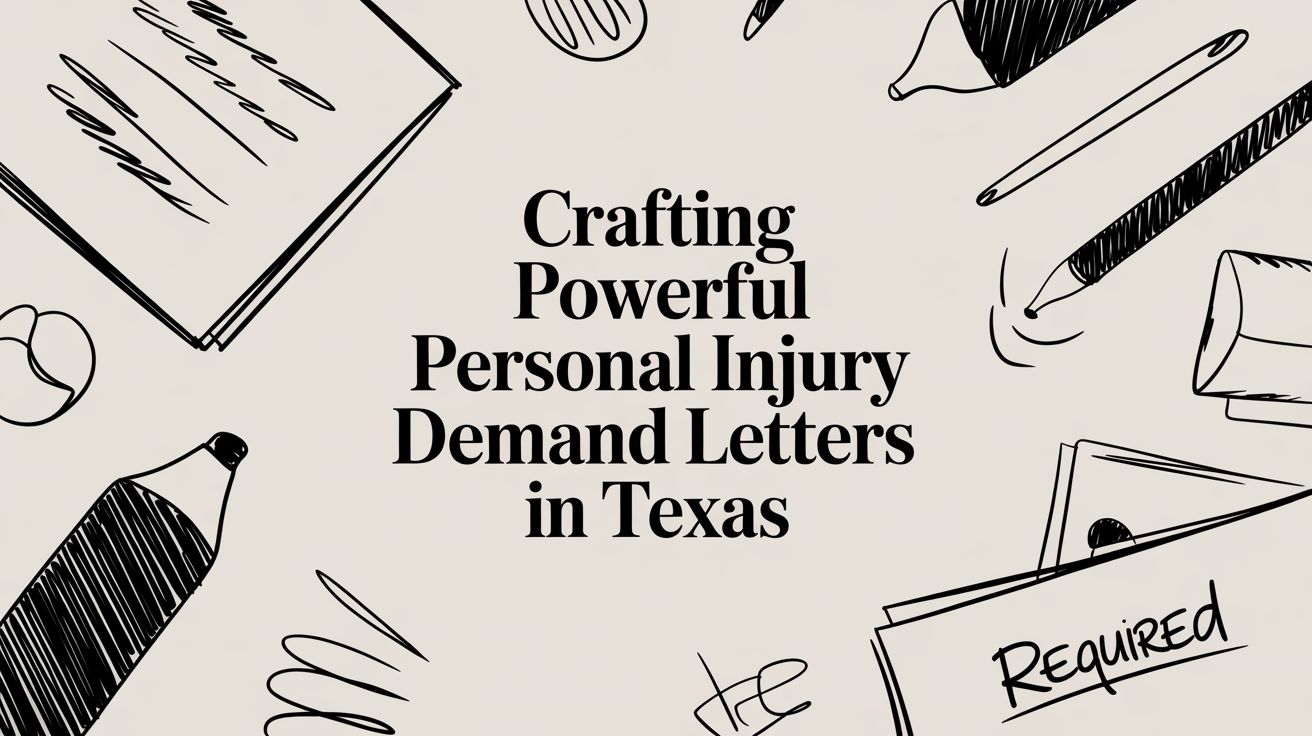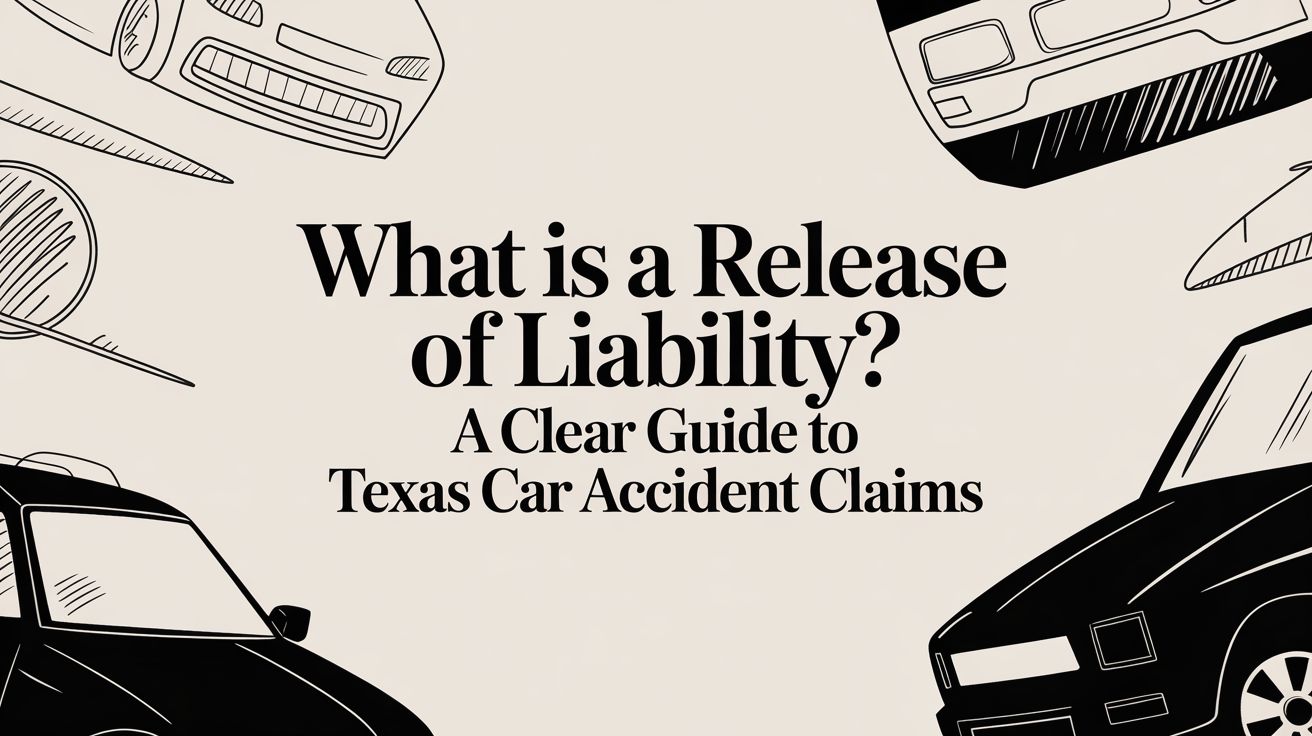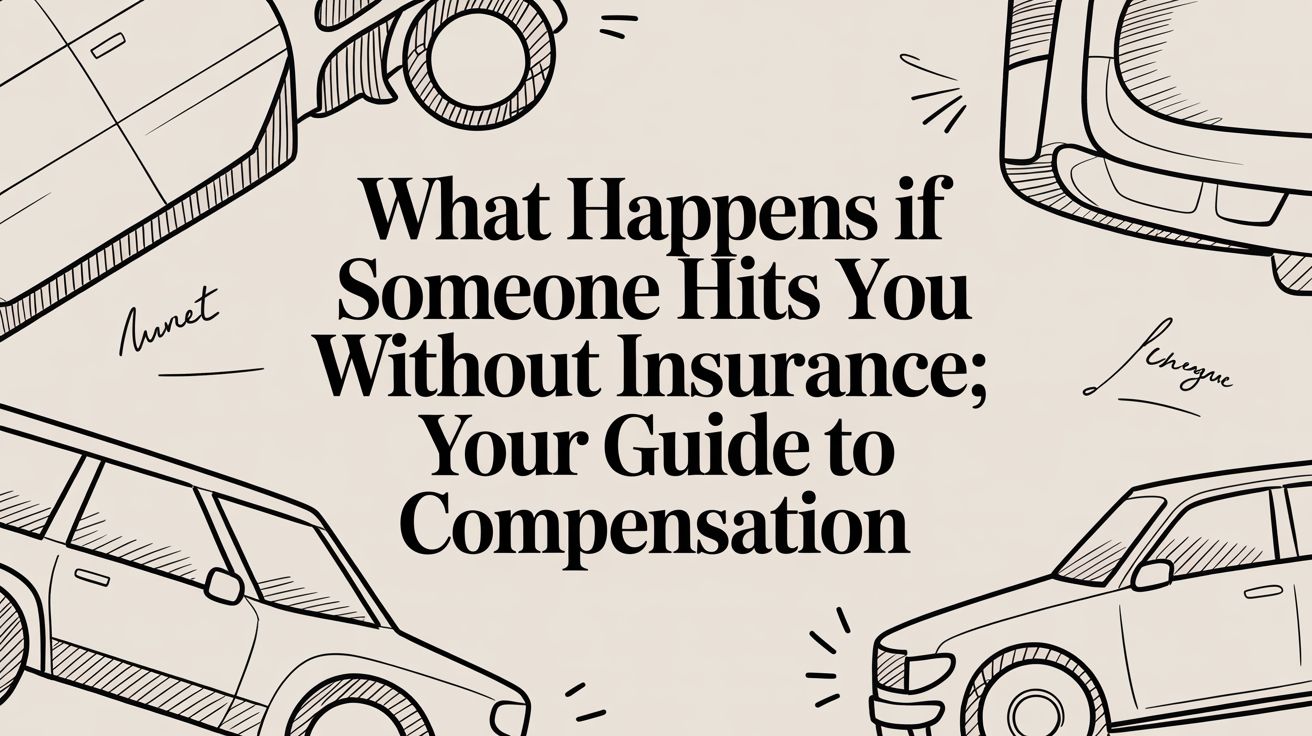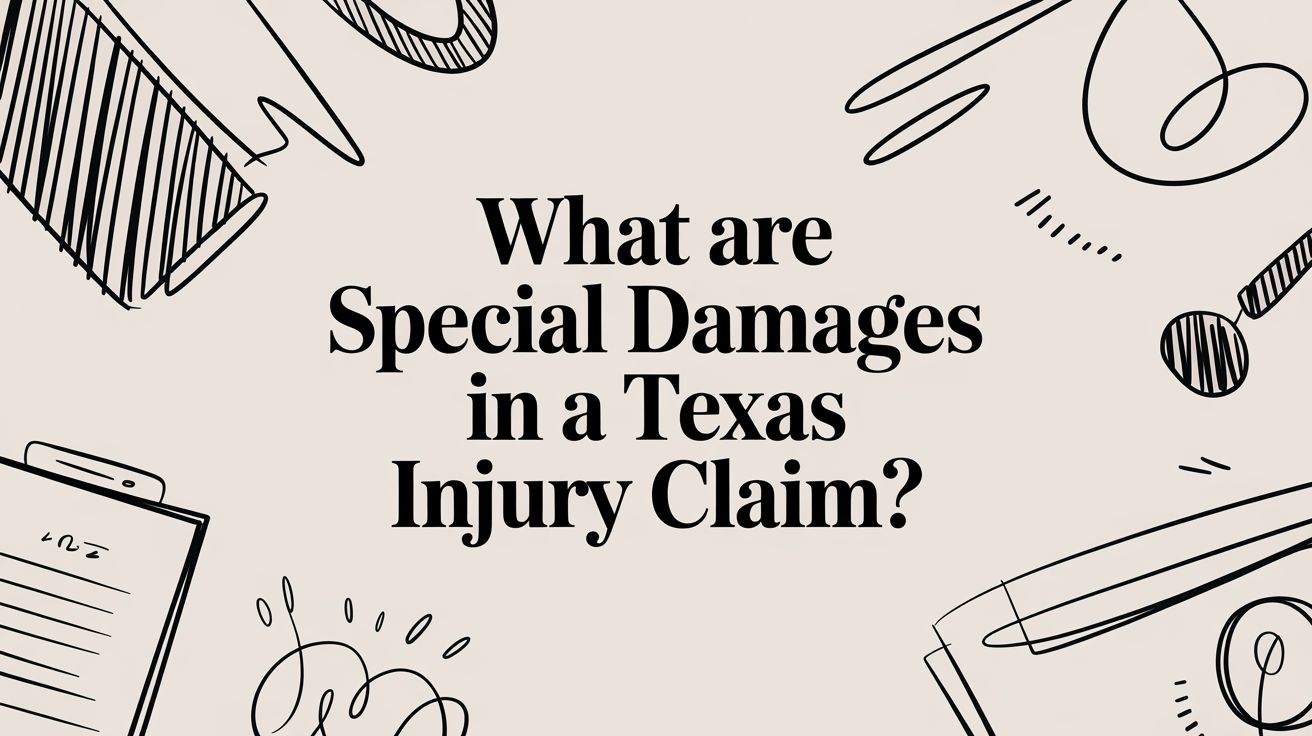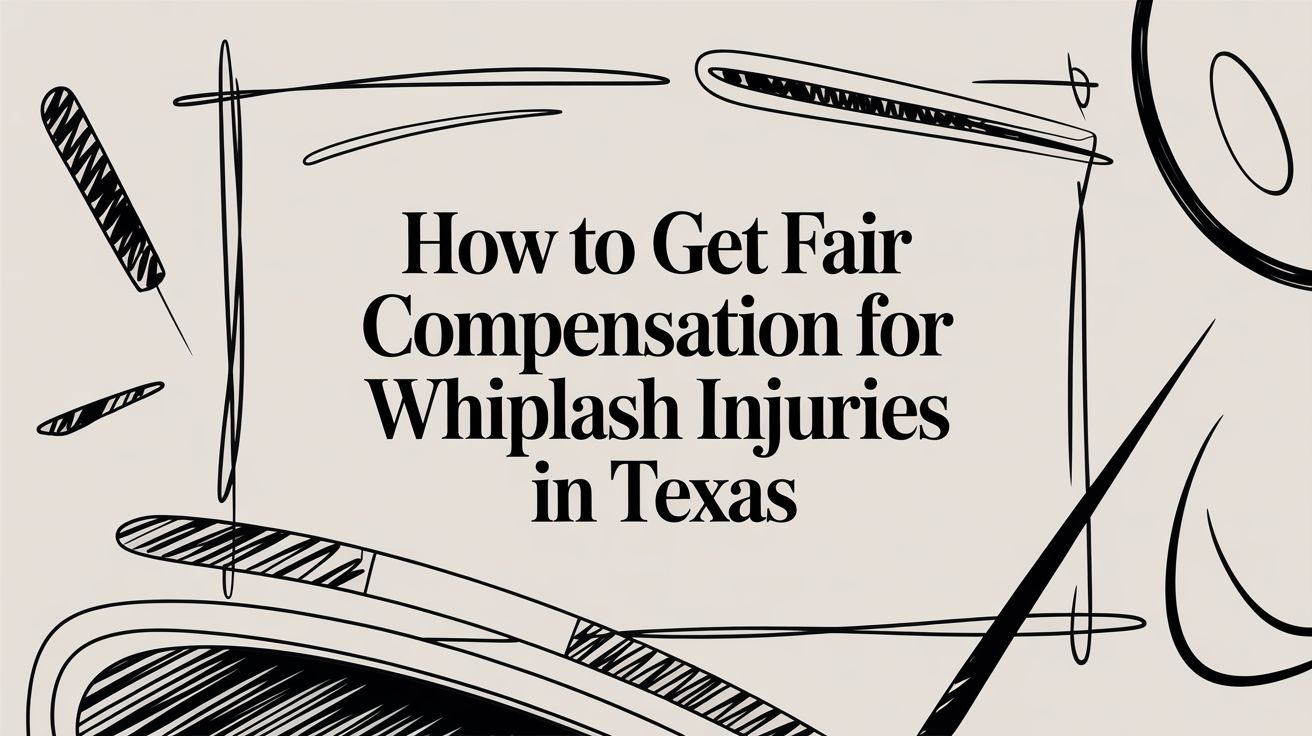A serious accident can change your life in seconds — but you don’t have to face it alone. In the moments after a crash, your world can feel turned upside down. The steps you take are critical for protecting your health and your legal rights. While your well-being is always the first priority, understanding what to do can make all the difference in your ability to get fair compensation.
Your First Steps After a Serious Injury

It’s easy to feel overwhelmed in the chaos of an accident. Your mind is racing, adrenaline is pumping—often masking the true extent of your injuries—and there's immense pressure to figure out what to do next. Taking a few focused actions right away can build a strong foundation for both your physical and financial recovery.
For example, after a Houston freeway crash on a busy road like I-45, drivers are often disoriented, stories conflict, and crucial evidence can disappear as soon as the scene is cleared. Those first few minutes are your best chance to establish what really happened and who was at fault.
Prioritize Health and Safety First
Nothing is more important than your health. Even if you think you feel fine, seek a medical evaluation immediately. Some of the most serious injuries, like internal bleeding or a traumatic brain injury, might not show symptoms for hours or even days.
If you delay getting checked out, you’re not just risking your health; you are giving the at-fault party's insurance company an excuse to argue that your injuries weren't caused by the accident. A documented medical visit creates a clear, undeniable link between the incident and the harm you suffered.
Gather and Preserve Crucial Evidence
If you are physically able to, try to document everything you can at the scene. This evidence becomes the cornerstone of a successful personal injury claim.
- Take Photos and Videos: Use your smartphone to capture everything. Get pictures of all the vehicles involved, the property damage, any skid marks on the road, nearby traffic signals, and your own injuries.
- Get a Police Report: Always insist that law enforcement comes to the scene. An official police report is a vital piece of evidence that provides a neutral, third-party account of the accident.
- Exchange Information: You’ll need to collect names, phone numbers, insurance information, and driver's license numbers from everyone involved. Don't forget to get contact info for any witnesses—their perspective can be invaluable.
A common mistake people make is relying solely on their memory. The stress of an accident blurs details. Photos, videos, and witness statements provide objective proof that is very difficult for an insurance adjuster to dispute.
Be Cautious with Insurance Companies
It won't be long before you get a call from the other driver’s insurance adjuster. It is crucial that you proceed with caution. They might sound friendly and concerned, but their goal is to protect their company's bottom line by paying out as little as possible on your claim. Avoid giving a recorded statement or accepting any quick settlement offer until you've spoken with a lawyer. An experienced Texas personal injury lawyer can handle these communications for you, protecting you from common traps.
Evaluating an Attorney’s Experience and Specialization

After a serious accident, it's tempting to hire the first lawyer you find. You're hurt, stressed, and you just want help. But not all attorneys have what it takes to navigate the complexities of Texas personal injury law. The lawyer who handles various legal matters may not have the focused experience needed to challenge a major insurance corporation.
This is one of the most important decisions you will make. Choosing a dedicated personal injury specialist over a general practitioner can mean the difference between a quick, lowball offer and the full compensation you need to rebuild your life.
Why Specialization Is a Non-Negotiable
Personal injury law isn't a single field; it's a collection of highly specific niches. Every type of case comes with its own unique laws, evidence requirements, and expert witnesses. An attorney's direct experience in cases like yours is the best indicator of how they will handle your claim.
Consider these real-world examples:
- Commercial Truck Accidents: If an 18-wheeler caused your injuries on I-10, you don't just need a car wreck lawyer. You need a truck crash lawyer Houston who understands federal trucking regulations, driver logbooks, and "black box" data. These cases are far more complex than a standard car accident.
- Wrongful Death Claims: Losing a family member is devastating. You need a compassionate wrongful death lawyer Texas who knows how to prove negligence while respectfully calculating the immense financial and emotional toll on your family.
- Catastrophic Injuries: For life-altering harm like a spinal cord or brain injury, you need an attorney with deep experience projecting future medical costs, lost earning capacity, and the need for lifelong care.
Verifying Credentials and a History of Success
Before you sign anything, it's time to do some research. Any reputable lawyer will be open about their background and results. A great first step is to check their standing with the State Bar of Texas to confirm they're licensed and have a clean disciplinary record.
But don't stop there. Look for tangible proof of their expertise. Go to their website and look for case results and testimonials from former clients. While past success never guarantees a future outcome, it shows they have a history of taking on tough fights—and winning them.
It's not just a feeling; the data backs it up. Studies consistently show that injured victims who hire experienced personal injury lawyers receive settlements nearly three times higher than those who represent themselves.
What’s more, statistics show that about 91% of plaintiffs with skilled legal representation reach a settlement, compared to only 51% of unrepresented individuals. That's the power of having a professional in your corner.
When your life has been turned upside down, especially in a major incident involving multiple victims, you need a firm built to handle that level of complexity. Some firms even have dedicated systems for things like mass tort intake services to manage many related claims at once. An experienced firm is your best possible ally in the fight to hold negligent parties accountable.
Key Questions to Ask During Your Consultation
Walking into a consultation with a personal injury attorney can feel intimidating, but remember: you are the one conducting the interview. This is your chance to assess their experience, approach, and communication style to see if they are the right fit for you.
It’s about more than just asking how long they’ve been practicing law. You need to understand how they would handle your specific case. Their answers will tell you everything you need to know about their process, how they treat their clients, and whether they are truly prepared to fight for you.
Who Will I Be Working With, and How Will We Communicate?
One of the biggest complaints people have about their attorneys is a lack of communication. A good attorney-client relationship is built on trust and clarity. You have a right to know exactly who is handling your case and how you will be kept informed.
Get practical right from the start and ask:
- Who will be my main point of contact? Will it be the lawyer I am meeting with, or will my case be passed to a paralegal or junior attorney?
- How often will I receive updates on my case? Setting this expectation upfront can save a lot of frustration.
- What's the best way to reach you if I have a question?
- How long does it typically take to get a response? This helps set a realistic timeline for communication.
A lawyer who gives you straightforward answers to these questions demonstrates a commitment to transparency.
You’re not just hiring a law firm; you are trusting a specific person or team with your future. You absolutely must feel comfortable with the people who will be answering your calls and guiding your decisions.
What Is the Strategy for My Case?
Most personal injury cases settle out of court, but you absolutely need a lawyer who is 100% prepared to go to trial if the insurance company refuses to offer a fair settlement.
Insurance companies know which law firms are willing to fight in court and which ones will accept a lowball offer to close a case quickly. An attorney's reputation as a skilled trial lawyer gives you powerful leverage during negotiations.
After a serious Houston car accident, an adjuster might make a quick, insulting settlement offer. An attorney known for taking cases to trial can counter with strong evidence and the real threat of letting a jury decide. That pressure is often what forces the insurance company to come back with a fair offer.
Here are the questions that get to the heart of the matter:
- Based on what I've told you, what's your initial strategy for my case?
- What are the biggest challenges or potential weaknesses you see?
- How much experience do you have in local courts, like here in Harris County?
- What percentage of your cases settle versus going to trial?
An attorney's willingness to go to trial isn't just for show—it's a crucial tool. It signals to the insurance company that you will not be bullied into taking less than your case is worth. When you have a proven litigator in your corner, you are negotiating from a position of strength, not desperation.
To help you get the most out of your meeting, we have prepared a checklist of essential questions. Use this to ensure you cover all the important bases and walk away with a clear picture of who you might be hiring.
Essential Questions for Your Attorney Consultation
| Question Category | Specific Question to Ask | Why It Matters |
|---|---|---|
| Experience & Focus | How much of your practice is dedicated to personal injury cases like mine? | You want a specialist, not a generalist who dabbles in injury law. A focused practice means deeper expertise. |
| Case Management | Who will be my primary point of contact throughout the case? | This tells you if you'll be working directly with the experienced attorney or if your case will be managed by staff. |
| Communication | How often can I expect to receive updates, and what's the best way to reach you? | Establishes clear expectations for communication, preventing frustration and ensuring you stay informed. |
| Strategy & Outlook | Based on the initial details, what is your assessment of my case's strengths and weaknesses? | A good lawyer will give you an honest, realistic perspective, not just tell you what you want to hear. |
| Trial Readiness | What percentage of your cases go to trial? Are you prepared to take my case to court if needed? | Shows whether they are negotiators who will settle low or fighters who can maximize your recovery by being trial-ready. |
| Fees & Costs | Can you explain your contingency fee structure and any case expenses I might be responsible for? | Ensures you have a crystal-clear understanding of the financial arrangement with no surprise costs later on. |
| Local Knowledge | How familiar are you with the local courts, judges, and opposing counsel in this area (e.g., Houston, Dallas)? | Local experience can be a significant strategic advantage in navigating the legal landscape specific to your county. |
Going into a consultation armed with these questions will empower you to make a smart, confident choice. The goal is to find a legal partner you trust, who communicates clearly, and who has the grit to fight for the compensation you deserve.
Understanding Legal Fees and Firm Resources
When you're already dealing with medical bills and lost wages, the last thing you need is another expense. Worries about cost should never stop you from seeking justice. Thankfully, Texas personal injury law allows you to hire a top-notch lawyer without paying anything out of pocket.
Almost every respected personal injury firm, including ours, works on a contingency fee basis. This is our promise to you: you pay absolutely nothing unless we win your case. There are no hourly fees or upfront retainers. Our fee is a pre-agreed percentage of the settlement or verdict we recover for you. This ensures our goals are perfectly aligned—we only succeed when you do.
How Contingency Fees Work
In Texas, a standard contingency fee is typically between 33.3% and 40% of the final recovery. The exact percentage often depends on the stage of your case—for example, it might be lower if we settle before filing a lawsuit and a bit higher if the case requires a full trial.
It’s also crucial to discuss case expenses. These are the upfront costs needed to build a winning claim, such as:
- Court filing fees
- Costs for obtaining medical records
- Fees for expert witnesses, like accident reconstruction specialists or medical experts
A trustworthy attorney will outline everything in a clear contract, explaining the fee percentage and how expenses are handled. Here at The Law Office of Bryan Fagan, PLLC, we ensure you understand every detail before you sign anything. No surprises.
The Importance of a Firm’s Resources
Challenging a large trucking corporation or a national insurance company is not just a legal battle—it's a financial one. These companies have teams of lawyers and vast resources, and they often use them to try to wear you down.
A law firm with significant resources can level the playing field. They have the financial strength to hire the best experts, fund thorough investigations, and take your case to trial without cutting corners. This sends a powerful message to the other side: you are serious, and you are prepared to fight for what you deserve.
The personal injury legal market generates an estimated $61.7 billion a year, and you need a firm that can compete in that arena. You can explore these personal injury statistics to see just how much of a difference a well-resourced attorney can make.
This infographic breaks down some of the key things—like strategy, communication, and trial readiness—that you should be asking about to really understand a firm's true capabilities.
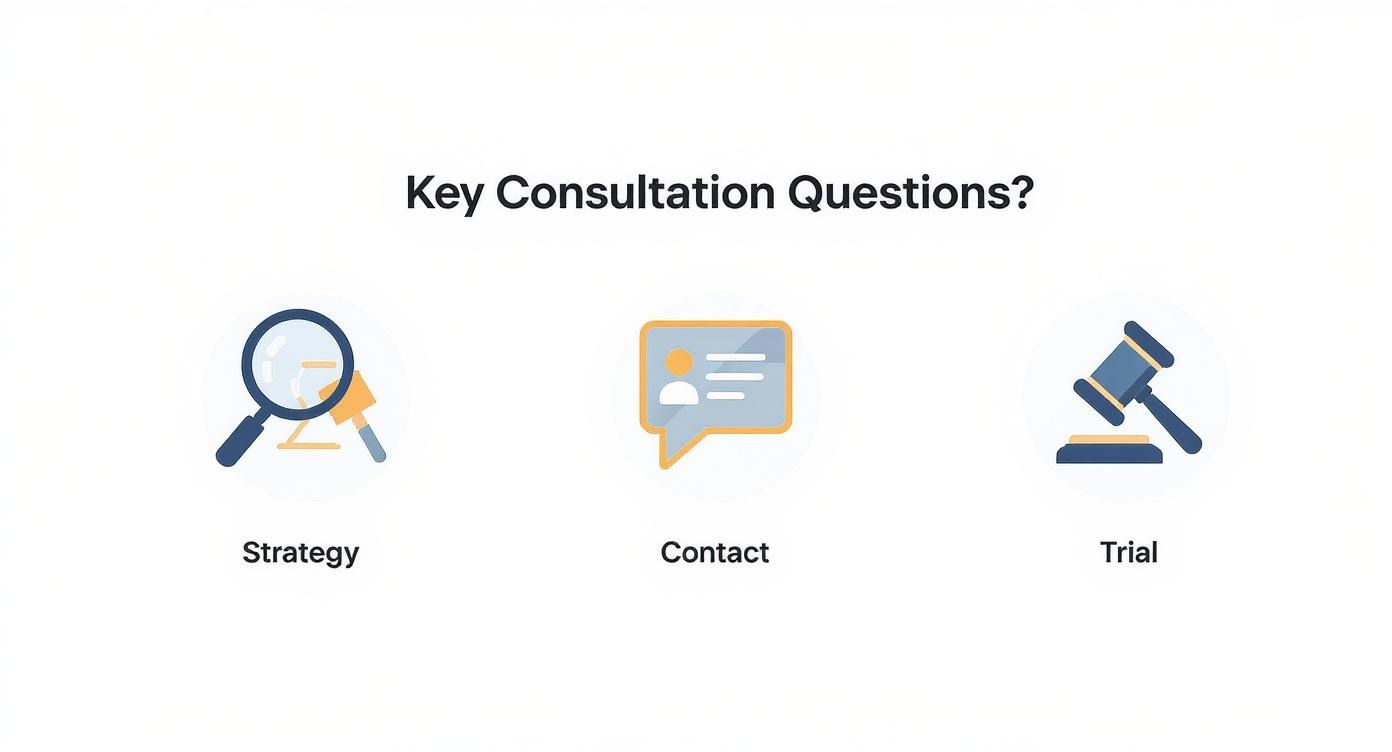
Making sure a firm has the financial stability to go the distance is one of the most important steps you can take. It reflects their ability to see your case through to the very end and secure the best possible outcome for you.
Red Flags to Watch For When Hiring a Lawyer

Choosing the right personal injury attorney is just as much about spotting the wrong one as it is about finding the perfect fit. A good lawyer-client relationship is built on trust, transparent communication, and aligned goals.
Unfortunately, some law firms are more interested in volume than in getting you the best result. Learning to recognize the warning signs early can save you frustration and ensure you have a true advocate in your corner.
Here are some major red flags to watch for.
Promises That Sound Too Good to Be True
This is one of the biggest warning signs. If an attorney guarantees a specific financial outcome during your initial consultation, you should be skeptical. No ethical, experienced lawyer can promise you a certain dollar amount.
The true value of a personal injury claim depends on many variables that are unknown at the beginning of a case. An honest lawyer will walk you through the potential strengths and weaknesses of your claim, discussing possibilities and strategies, not certainties. Be wary of anyone who sounds more like a salesperson than a legal professional.
A lawyer’s job is to fight for the best possible outcome, not to predict the future. Guarantees are often a sign of inexperience or a tactic to get you to sign a contract under false pretenses.
High-Pressure Tactics and Unethical Contact
You should never feel rushed or pressured into signing a fee agreement. A reputable attorney understands this is a big decision and will give you the time and space you need. If you hear things like "this offer is only good for today" or feel like you have to sign on the spot, that's your cue to walk away.
Another serious ethical red flag is unsolicited contact. If a lawyer or their representative calls, visits, or sends you mail you didn't ask for after your accident, this is a major warning sign. This practice, known as solicitation, is strictly prohibited by the State Bar of Texas.
Lack of Communication and Transparency
The law firm you hire should be your partner through this difficult process. If your calls are ignored, your emails go unanswered, or you can never seem to speak with an actual attorney, that’s a bad sign. It often means your case is not a priority. This is a common problem with "settlement mills"—high-volume firms that treat clients like case numbers.
Your attorney should be able to clearly explain their strategy for your case and keep you updated on important developments. If they’re evasive, use confusing legal jargon, or seem annoyed by your questions, it’s time to find someone else. You deserve a Texas personal injury lawyer who treats you with respect and keeps you informed every step of the way.
How Long Do You Have to File a Claim in Texas?
After a serious accident, your head is probably swimming with questions. It's a confusing and stressful time, but you don't have to figure it all out on your own. We've put together answers to some of the most common questions we hear to give you clarity as you decide on your next steps.
In Texas, the law gives you a strict deadline to file a lawsuit, known as the statute of limitations. For most personal injury cases, including those from car accidents or slip and falls, that deadline is two years from the date of the incident.
While a few rare exceptions exist, that two-year window is critical. If you miss it, you will likely lose your right to seek compensation forever. This is why it’s so important to speak with an attorney as soon as possible—they can ensure your rights are protected before it’s too late.
What if I Was Partially to Blame for the Accident?
This is a common worry, but don't assume you are out of options. Texas follows a legal rule called modified comparative fault, also known as proportionate responsibility. Under this principle, your ability to recover compensation depends on the degree of your own negligence.
Here’s how it works: you can still recover damages for your injuries as long as you are not found to be 51% or more at fault. The compensation you receive will simply be reduced by your percentage of fault. For example, if a jury determines you were 20% responsible for a car crash, you could still recover 80% of your total damages. An experienced Houston car accident attorney knows how to build a case that minimizes any fault assigned to you and maximizes your recovery.
The Insurance Company Already Made an Offer. Should I Accept It?
No. You should never accept an offer from an insurance company without first consulting with a lawyer. The initial offer is almost always a lowball tactic used to close your case quickly and for as little money as possible.
Remember, the insurance adjuster works for the insurance company, not for you. Their job is to protect their employer's profits. That first offer rarely accounts for future medical treatments, the full scope of your lost wages, or the true value of your pain and suffering. An experienced lawyer will calculate the true, long-term value of your claim and fight for the full and fair compensation you deserve.
At The Law Office of Bryan Fagan, PLLC, we have seen firsthand the physical, emotional, and financial chaos a serious accident can cause. You don’t have to carry this burden alone. We are here to offer experienced guidance and the dedicated advocacy needed to help you secure your future. We want you to know that recovery is possible, and legal help is available.
If you have questions or are ready to discuss your case, contact us today for a free, no-obligation consultation. Let us help you take the first step toward justice and getting your life back on track.



